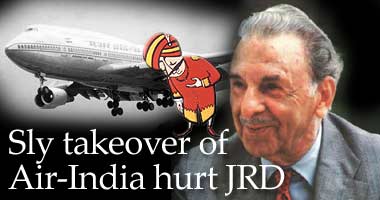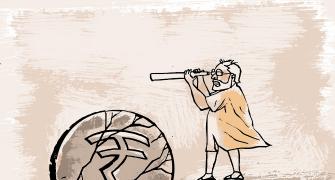
Air-India founder J R D Tata was deeply distressed by the decision of the government to nationalise the aviation business "through the back door" and even suspected that the airline was deliberately bad-mouthed so that it could be acquired after its value came down, letters written by the father of Indian aviation reveal.
Piqued by a speech by then Communications Minister Rafi Ahmed Kidwai in the Constituent Assembly in 1949, Tata had written to then Prime Minister Jawaharlal Nehru that "by resorting to incorrect and unfair statements and allegations, he (Kidwai) has convinced the majority of the members of the Assembly ... that the airlines in general, and Air-India in particular, are dishonest and greedy, cannot be trusted, and fully deserve their present plight."
The document is a part of a collection of about 300 letters written by Jehangir Ratanji Dadabhoy Tata, which were published to mark the eminent industrialist's 100th birth anniversary on July 29, 2004.
Nehru had immediately replied to Tata refuting "the charge you made ... which amounted to a planned conspiracy to suppress private civil aviation and, more particularly, Tata's air services."
In his letter, Nehru said "the purpose of my writing to you is to remove the impression from your mind that any policy has been pursued by us with the deliberate intention of acquiring ......"
Tata, the first Indian to qualify as a pilot, had started the country's first airline with the famous flight from Karachi to Mumbai on October 15, 1932.
Air India International was set up in 1948 as the country's first joint sector project between the government and the private sector to start an overseas service. Five years later, the government decided to nationalise the aviation business.
Greatly disturbed by the step, Tata shot off a telegram to Nehru, which said. "I can only deplore that so vital a step should have been taken without giving us a proper hearing.
"(Former Tata Steel CEO Russi) Modi and I were called by (then Communications Minister) Jagjivan Ram only to be informed of the government's decision to nationalise the industry.
"Although I told him that I had prepared and brought with me an alternative scheme, which in my humble judgement was better calculated to achieve the government's objective, the minister sought our advice only on questions of compensation and the like," he said.
Tata later wrote to Sir Frederick James, then in-charge of the Delhi office of the Tatas: "Even more than the decision itself, I was upset by the manner in which nationalisation was introduced through the back door without any prior consultation of any kind with the industry.
"However, we have to reconcile ourselves to the fact that we are living in a political and bureaucratic age in which people like ourselves no longer count for much in the scheme of things," he lamented.
The government, apparently, had more respect for Tata than he thought as it agreed to his suggestion to set up two aviation corporations - one for domestic operations and one for international. Nehru invited Tata to chair the global airline and he agreed.
Tata continued as chairman of Air-India till 1978, when his services were unceremoniously terminated by then Prime Minister Morarji Desai.
Desai sent a terse letter to Tata informing him of the government's decision to appoint former Air Chief Marshall P C Lal as chairman of Air-India.
This prompted the industrialist to reply that "in the light of the work I performed for government as a labour of love during the past 25 years, I hope you will not consider it presumptous of me to have expected that when government decided to terminate my services and my 45 years' association with Indian civil aviation, I would be informed of their decision directly and, if possible, in advance of the public, instead of the news being communicated to me by my successor."
Despite efforts by Desai to pacify him, Tata ended furthur communication on the matter with a curt message: "I do not wish to prolong this correspondence which I am sure is as distasteful to you as it is to me."
Tata, who was re-appointed to the Board of Air-India by Indira Gandhi after she returned to power in 1980, was intimately involved with the running of the airline and made regular suggestions to improve its services, his letters reveal.
He sent regular notes to the airline management on almost everything from refreshments to decor and even hair-do of the air hostesses.
However, Tata always made it clear that his notes were only comments and suggestions to help the management.
"They are not on any account to be treated as complaints or instructions from the chairman," he wrote.
<I>PTI</I>







